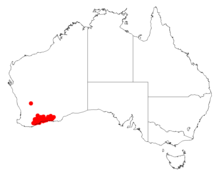| Salt gully wattle | |
|---|---|
| Scientific classification | |
| Kingdom: | Plantae |
| Clade: | Tracheophytes |
| Clade: | Angiosperms |
| Clade: | Eudicots |
| Clade: | Rosids |
| Order: | Fabales |
| Family: | Fabaceae |
| Subfamily: | Caesalpinioideae |
| Clade: | Mimosoid clade |
| Genus: | Acacia |
| Species: | A. patagiata
|
| Binomial name | |
| Acacia patagiata | |

| |
| Occurrence data from AVH | |
Acacia patagiata, also commonly knowns as salt gully wattle,[1] is a shrub of the genus Acacia and the subgenus Plurinerves that is endemic to south western Australia.
Description[edit]
The rounded shrub typically grows to a height of 0.5 to 2.5 metres (2 to 8 ft)[2] and has glarous to very lightly haired branchlets. Like most species of Acacia it has phyllodes rather that true leaves. The rigid, leathery, glabrous and pungent grey-green phyllodes are ascending to erect and have an oblong-oblanceolate to elliptic shape and are slightly to shallowly to strongly incurved. The phyllodes are around 2.5 to 5.5 cm (0.98 to 2.17 in) in length and 3 to 8 mm (0.12 to 0.31 in) wide and have many fine, parallel veins with the central nerve more prominent than the others.[3] It blooms from July to September and produces yellow flowers.[2]
Taxonomy[edit]
The species was first formally described by the botanists Richard Sumner Cowan and Bruce Maslin in 1990 as a part of the work Acacia Miscellany 3. Some new microneurous taxa of Western Australia related to A. multineata (Leguminosae: Mimosoideae: Section Plurinerves) from Western Australia as published in the journal Nuytsia.[4] It is very similar in appearance to Acacia lineolata subsp. multilineata and also Acacia unguicula to a lesser degree. It also resembles Acacia mimica.[3]
Distribution[edit]
It is native to an area in the Wheatbelt, Great Southern and Goldfields-Esperance regions of Western Australia where it is commonly situated along salt rivers and creeks and along the margins of salt lakes and salt pans growing in sandy, sandy-loam or clay soils.[2] The range of the plant extends from around Pingrup in the north west to around Mount Ney in the east.[3]
See also[edit]
References[edit]
- ^ "Acacia patagiata Salt Gully Wattle". Nindethana Australian Seeds. Retrieved 26 December 2020.
- ^ a b c "Acacia patagiata". FloraBase. Western Australian Government Department of Biodiversity, Conservation and Attractions.
- ^ a b c "Acacia patagiata". World Wide Wattle. Western Australian Herbarium. Retrieved 26 December 2020.
- ^ "Acacia patagiata R.S.Cowan & Maslin". Atlas of Living Australia. Global Biodiversity Information Facility. Retrieved 26 December 2020.